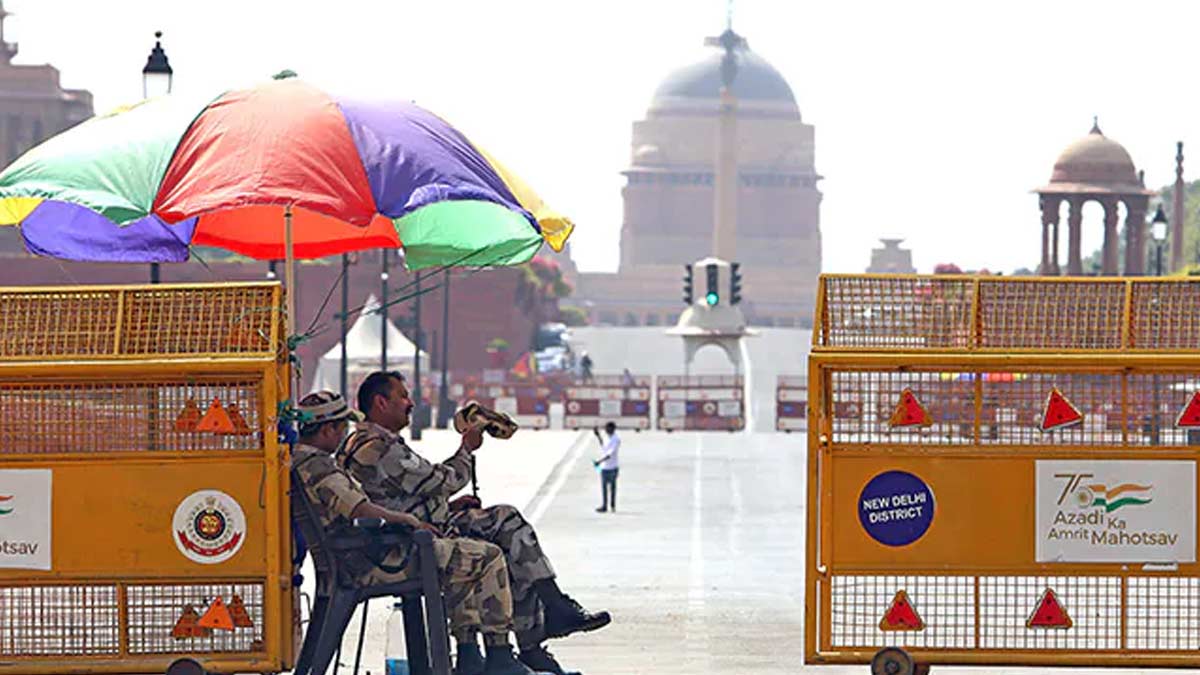
Delhi has been experiencing a brutal heatwave, with temperatures soaring past 47 degrees Celsius in various parts of the city. The India Meteorological Department (IMD) has issued a 'red alert' for the next five days, warning of heatwave to severe heatwave conditions. This extreme weather event has significant implications for residents, with both health risks and infrastructural strains coming to the forefront.
Table of Content:-
Record-Breaking Temperatures
The national capital has been in the grip of an intense heatwave, with temperatures steadily climbing over recent days. The highest temperature recorded so far this summer was 47.8 degrees Celsius in Najafgarh, making it the hottest spot in the country this season. Other areas, including Mungeshpur, Aya Nagar, Pusa, Pitampura, and Palam, have also reported temperatures exceeding 45 degrees Celsius. The relentless heat has pushed Delhi's peak power demand to a new high for May, reaching 7,572 MW, surpassing the previous record of 7,438 MW set last August.
Impact on Daily Life
The searing temperatures are causing considerable distress across the city. Low-income households, particularly those with limited access to cooling solutions and adequate water supply, are among the hardest hit. Additionally, the need to venture outdoors for work or other essential activities is testing the resilience of many residents.

The Delhi government has mandated that all schools, including government-aided and unaided private institutions, commence summer vacations immediately. This directive aims to protect children from the harsh conditions. Meanwhile, the city's zoo has taken steps to safeguard animals, providing them with water coolers, straw shelters, and other cooling measures.
Health Risks and Precautions
The IMD has emphasised the severe health risks posed by the heatwave, particularly for vulnerable groups such as infants, the elderly, and those with chronic health conditions. Heat-related illnesses, including heat stroke, are a significant concern. To mitigate these risks, it is crucial to take appropriate precautions. Here are some do’s and don’ts as per Dr Sandeep Gore, Director-Emergency Medicine, Fortis Hospital, Mulund.
Also Read: Katrina Kaif-Vicky Kaushal’s New Video Raises Speculations Of Pregnancy; Weird Early Pregnancy Signs
Do’s During a Heatwave
- Stay Indoors: Limit outdoor activities, especially between 12 PM and 3 PM when the sun is at its peak.
- Hydrate: Drink plenty of water regularly, even if you don't feel thirsty. Incorporate ORS or homemade drinks like lassi, rice water, lemon water, and buttermilk into your diet to stay hydrated.
- Wear Appropriate Clothing: Opt for lightweight, loose-fitting, and light-coloured cotton clothes. Use hats, sunglasses, and umbrellas for protection against direct sunlight.
- Use Cooling Measures: Keep your home cool with curtains, shutters, or sunshades. Use fans, take cold showers, and wear damp clothing to help lower your body temperature.
- Care for Animals: Ensure pets and other animals have access to shade and plenty of water.
Don’ts During a Heatwave
- Avoid Strenuous Activities: Refrain from engaging in intense physical activities, particularly during peak heat hours.
- Limit Consumption of Dehydrating Beverages: Avoid alcohol, tea, coffee, and carbonated drinks as they can lead to dehydration.
- Avoid Stale and High-Protein Foods: Stick to fresh foods and avoid high-protein diets that can increase metabolic heat.
- Do Not Leave Children or Pets in Parked Vehicles: Vehicles can become dangerously hot very quickly.
Emergency Response to Heat-Related Illness
If someone shows signs of heat exhaustion or heat stroke, it's essential to act quickly:
- Move to a Cooler Place: Get the affected person to a shaded or cool area.
- Cool Down: Use wet cloths to wipe the person down or pour cool water over their body. Focus on bringing down their body temperature.
- Rehydrate: Provide ORS solutions or drinks like lemon water or rice water to rehydrate.
- Seek Medical Help: Transport the person to the nearest health facility promptly, as heat stroke can be fatal if not treated immediately.
Bottomline
As Delhi faces these extreme weather conditions, it is imperative for residents to take these precautions seriously. Staying informed and prepared can help mitigate the risks posed by this severe heatwave, ensuring safety and well-being for all.
Also watch this video
How we keep this article up to date:
We work with experts and keep a close eye on the latest in health and wellness. Whenever there is a new research or helpful information, we update our articles with accurate and useful advice.
Current Version